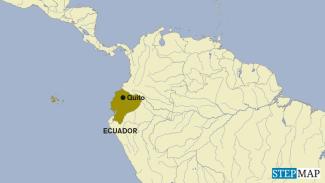Natural resources
Protecting ancestral land

The Waorani have taken the Ministry of Energy, the Secretary of Hydrocarbons and the Ministry of Environment to court for violating their rights. They claimed that the consultation process conducted before putting their territory up for an international oil auction was flawed.
Over the past two decades, Ecuador has divided a large portion of its Amazon forests into blocks to lease the mineral rights, specifically for oil, in international auctions. Oil plays a very important part in Ecuador’s economy. It has contributed to most of the country’s growth between 2006 and 2014, before the oil prices collapsed. On the other hand, the oil-rigging activities negatively affected indigenous communities in the Amazon rainforest: their habitat was contaminated, and communities were displaced.
Both national and international laws state that a free, prior and informed consultation process must be conducted before the planning of any extraction process on or near territories belonging to indigenous groups. In 2012, the consultation process – which never mentioned the expected environmental effects –with several indigenous groups including the Waorani had led to the division of the Amazon rainforest area in Ecuador into 16 different oil blocks for sale purposes.
Nemonte Nenquimo, one of the Waorani plaintiffs and representative of the Coordinating Council of the Waorani Nationality Ecuador Pastaza (CONCONAWEP), says that the consultation process was conducted “for the sake of being conducted” and that it was “tokenistic”. “We fought in court so that no one can enter our territory for petrol. We want to save our territory and our jungles. They are our children’s heritage,” Nenquimo says.
Due to the recent ruling in favour of the Waorani, 52 mining concessions along the Aguarico river were cancelled. This helps to protect half a million acres of Waorani territory in the Amazon rainforest from being earmarked for oil drilling.
According to the local non-governmental organisation Amazon Frontlines, which had provided legal support to the Waorani, the verdict provides an “invaluable legal precedent for other indigenous nations across the Ecuadorian Amazon”. However, the Ministry of Energy plans to appeal against the decision.
In the meantime, the Waorani people keep on fighting. They have been organising regular protests in Quito, the capital city, and recently launched “Waorani Resistance”, a global campaign to get 500,000 people to sign a declaration to defend the rainforest. That would be one person for every acre that the Waorani are protecting.
Link
Amazon Frontline – Waorani Resistance:
https://waoresist.amazonfrontlines.org/
Roli Mahajan is a freelance journalist and photographer. She lives in New Delhi, India, and has recently spent some time in Ecuador as a Rotary Peace Fellow.
roli.mahajan@gmail.com







